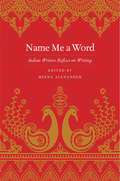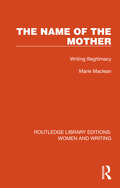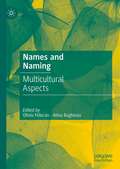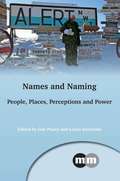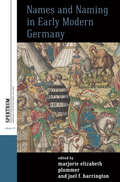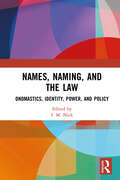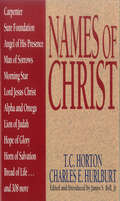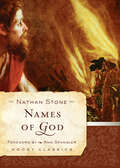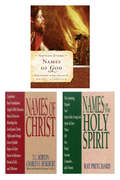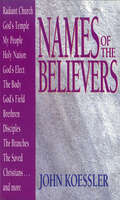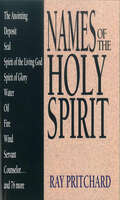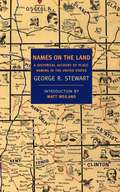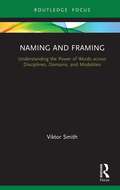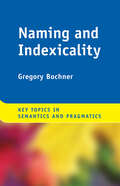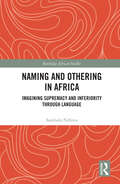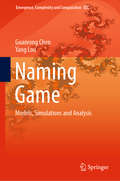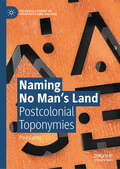- Table View
- List View
Name Me a Word: Indian Writers Reflect on Writing
by Meena AlexanderA wide-ranging anthology of twentieth-century and contemporary writing from India and the Indian diaspora, curated by a distinguished scholar and poet Internationally renowned scholar, poet, and essayist Meena Alexander brings together leading twentieth- and twenty-first-century voices from India and the diaspora in this anthology. Contributors include English-language luminaries such as R. K. Narayan, Salman Rushdie, and Arundhati Roy and powerful writers in Indian languages such as U. R. Ananthamurthy, Mahasweta Devi, and Lalithambika Antherjanam. This book will make a thoughtful gift for poetry and fiction enthusiasts and fans of Indian literature, as well as an ideal volume for academics introducing writers from the subcontinent.
The Name of the Mother: Writing Illegitimacy (Routledge Library Editions: Women and Writing)
by Marie MacleanIn this original and highly accomplished study, first published in 1994, Marie Maclean studies the writings of social rebels and explores the relationship between their personal narratives and illegitimacy. The case studies which Maclean examines fall into four groups: those which stress alternative family structures and ‘female genealogies’; those which pair female illegitimacy and revolution; those which question the deliberate refusal of the name of the father by the legitimate; those which study the revenge of genius on the society which excludes it. Skilfully interweaving feminist theory, French literary criticism, social and cultural history, deconstruction and psychoanalytic theory, Maclean traces the place of these personal narratives of illegitimacy in history and their use in theory, from Elizabeth I to Freud, Sartre and Derrida. The Name of the Mother will be of vital interest and importance to any student of critical theory, feminist philosophy, French or cultural studies.
Name that Feeling: A Turn-and-See Book (What's Next?)
by Cari MeisterLightning flashes. Thunder rumbles. It’s a big storm! How do you think Micah feels? Woof! Woof! Gemma’s grandma brought her a puppy. How do you think Gemma feels? Turn the page to find out which feeling matches the description. Would you feel the same way?
The Names
by N. Scott MomadayOf all of the works of N. Scott Momaday, The Names may be the most personal. A memoir of his boyhood in Oklahoma and the Southwest, it is also described by Momaday as "an act of the imagination."
Names and Naming: Multicultural Aspects
by Oliviu Felecan Alina BugheșiuThis edited book examines names and naming policies, trends and practices in a variety of multicultural contexts across America, Europe, Africa and Asia. In the first part of the book, the authors take theoretical and practical approaches to the study of names and naming in these settings, exploring legal, societal, political and other factors. In the second part of the book, the authors explore ways in which names mirror and contribute to the construction of identity in areas defined by multiculturalism. The book takes an interdisciplinary approach to onomastics, and it will be of interest to scholars working across a number of fields, including linguistics, sociology, anthropology, politics, geography, history, religion and cultural studies.
Names and Naming
by Guy Puzey Laura KostanskiThis book explores international trends in naming and contributes to the growing field of onomastic enquiry. Naming practices are viewed here through a critical lens, demonstrating a high level of political and social engagement in relation to how we name people and places. The contributors to this publication examine why names are not only symbols of a person or place, but also manifestations of cultural, linguistic and social heritage in their own right. Presenting analyses of geographically and culturally diverse perspectives and case studies, the book investigates how names can represent deeper kinds of identity, act as objects of attachment and dependence, and reflect community mores and social customs while functioning as powerful mechanisms of inclusion and exclusion. The book will be of interest to researchers in onomastics, sociology, human geography, linguistics and history.
Names and Naming in Early Modern Germany (Spektrum: Publications of the German Studies Association #20)
by Marjorie Elizabeth Plummer Joel F. HarringtonThroughout the many political and social upheavals of the early modern era, names were words to conjure by, articulating significant historical trends and helping individuals and societies make sense of often dramatic periods of change. Centered on onomastics—the study of names—in the German-speaking lands, this volume, gathering leading scholars across multiple disciplines, explores the dynamics and impact of naming (and renaming) processes in a variety of contexts—social, artistic, literary, theological, and scientific—in order to enhance our understanding of individual and collective experiences.
Names, Naming, and the Law: Onomastics, Identity, Power, and Policy
by I. M. NickAcross many social and commercial domains, governments regulate the official names used to identify individuals, groups, places, companies & products, and even diseases. This innovative volume investigates the relationship between names and the law, with its significant implications for identity (individual, familial, race, ethnicity, gender, species, brand & product industry, etc.) and status (social, scientific, economic, and political). I. M. Nick introduces the state of the art on this interdisciplinary topic¾ providing a diachronic and synchronic view of onomastics and the law¾ and expert contributors examine seminal Anglo-American legal cases to demonstrate how name polices relate to broader questions of power, privilege, and politics. Each chapter offers an overview of key issues in onomastics and language policy across multiple geo-cultural contexts, and applies the interdisciplinary insights to real-world policies. This book is a valuable resource for scholars of legal linguistics, forensic linguistics, onomastics, language policy, and cultural studies.
Names Of Christ (Names of... Series)
by T. C. Horton Charles E. HurlburtLily of the Valley. Bright and Morning Star. Rose of Sharon. Author of the Faith. The Lord Jehovah. Friend of Sinners. Son of Man. King of Kings.What does Christ mean to you? When you consider His person, His work, and His words, are you struck by the depth and complexity, the richness and incalculable beauty of who He is? This classic study, revised for today's reader, examines the many names of Christ, more than 300 in all, each revealing an intimate portrait of the Savior. In this new edition, devotional prayers accompany each name, helping you meditate on the character and person of Jesus Christ. This book is an invaluable resource to any library and is sure to enrich your personal devotional time. Names of Christ follows Names of God in a classic trilogy designed to help contemporary Christians better understand the glory, majesty, and power of the triune God.
Names Of Christ (Names of... Series)
by T. C. Horton Charles E. HurlburtLily of the Valley. Bright and Morning Star. Rose of Sharon. Author of the Faith. The Lord Jehovah. Friend of Sinners. Son of Man. King of Kings.What does Christ mean to you? When you consider His person, His work, and His words, are you struck by the depth and complexity, the richness and incalculable beauty of who He is? This classic study, revised for today's reader, examines the many names of Christ, more than 300 in all, each revealing an intimate portrait of the Savior. In this new edition, devotional prayers accompany each name, helping you meditate on the character and person of Jesus Christ. This book is an invaluable resource to any library and is sure to enrich your personal devotional time. Names of Christ follows Names of God in a classic trilogy designed to help contemporary Christians better understand the glory, majesty, and power of the triune God.
Names Of God (Names of... Series)
by Nathan StoneJehovah-tsidkenu, "the Lord our righeousness"; Jehovah-shalom, "the Lord our peace"; Jehovah-jireh, "the Lord will provide."This is a study of the twelve most common Hebrew names for God-and their significance and fulfillment in Christ. God's names reveal not only different dimensions of His character but also point to their fulfillment in the Person and work of Jesus Christ. This classic study examines the Old Testament names of God and the particular aspect of His character and dealings with man that each reveals. Names of God is a book that will help contemporary Christians better understand the glory, majesty, and power of God. (More than 115,000 in print)
Names Of God (Names of... Series)
by Nathan StoneJehovah-tsidkenu, "the Lord our righeousness"; Jehovah-shalom, "the Lord our peace"; Jehovah-jireh, "the Lord will provide."This is a study of the twelve most common Hebrew names for God-and their significance and fulfillment in Christ. God's names reveal not only different dimensions of His character but also point to their fulfillment in the Person and work of Jesus Christ. This classic study examines the Old Testament names of God and the particular aspect of His character and dealings with man that each reveals. Names of God is a book that will help contemporary Christians better understand the glory, majesty, and power of God. (More than 115,000 in print)
Names of God/Names of Christ/Names of the Holy Spirit Set
by Nathan Stone T.C. Horton Charles E. Hurlburt Ray PritchardThis complete, three-volume set includes Names of God, Names of Christ, and Names of Holy Spirit.In Names of God, Nathan J. Stone writes, &“Indeed we cannot say all that the mysterious word God means to us until we know more about Him.&” God&’s many names reveal not only different dimensions of His character but also point to their fulfillment in the Person and work of Jesus Christ. This insightful little book accurately and clearly works through the many names of God throughout the Old Testament. We can now see God in new lights and angles as we learn of His justice, His unbounded love, His preeminence, and His character--all through His names. In Names of Christ, more than 300 names of Christ are examined in all, each revealing an intimate portrait of the Savior. In this new edition, devotional prayers accompany each name, helping you meditate on the character and person of Jesus Christ. This book is an invaluable resource to any library and is sure to enrich your personal devotional time. In Names of the Holy Spirit, the author examines the Holy Spirit's ministry throughout Scripture as revealed in the names the Bible gives Him. Knowledge of Him will help you understand:His power His indwelling His anointing His intercession His gifts Fruit produced in believers
Names of God/Names of Christ/Names of the Holy Spirit Set
by Nathan Stone T.C. Horton Charles E. Hurlburt Ray PritchardThis complete, three-volume set includes Names of God, Names of Christ, and Names of Holy Spirit.In Names of God, Nathan J. Stone writes, &“Indeed we cannot say all that the mysterious word God means to us until we know more about Him.&” God&’s many names reveal not only different dimensions of His character but also point to their fulfillment in the Person and work of Jesus Christ. This insightful little book accurately and clearly works through the many names of God throughout the Old Testament. We can now see God in new lights and angles as we learn of His justice, His unbounded love, His preeminence, and His character--all through His names. In Names of Christ, more than 300 names of Christ are examined in all, each revealing an intimate portrait of the Savior. In this new edition, devotional prayers accompany each name, helping you meditate on the character and person of Jesus Christ. This book is an invaluable resource to any library and is sure to enrich your personal devotional time. In Names of the Holy Spirit, the author examines the Holy Spirit's ministry throughout Scripture as revealed in the names the Bible gives Him. Knowledge of Him will help you understand:His power His indwelling His anointing His intercession His gifts Fruit produced in believers
Names of the Believers (Names of... Series)
by John KoesslerWhat's in a name?In our culture, parents often select names for their children that are popular or have a nice ring to them. But our heavenly Father bestows on His children names that carry far more meaning and significance. In fact, the Bible reveals many labels believers have that indicate calling, position, and giftedness in Christ.In this devotional study, Dr. John Koessler shows that the names Christ gives to His followers contain more importance and richness than we often realize. Written in a fresh and compelling style, Names of the Believers will encourage and inspire Christians to live up to the names God Himself has given them.Names of the Believers follows the Names of God, Names of Christ, and Names of the Holy Spirit trilogy designed to help Christians better understand the glory, majesty, and power of the triune God.
Names of the Believers (Names of... Series)
by John KoesslerWhat's in a name?In our culture, parents often select names for their children that are popular or have a nice ring to them. But our heavenly Father bestows on His children names that carry far more meaning and significance. In fact, the Bible reveals many labels believers have that indicate calling, position, and giftedness in Christ.In this devotional study, Dr. John Koessler shows that the names Christ gives to His followers contain more importance and richness than we often realize. Written in a fresh and compelling style, Names of the Believers will encourage and inspire Christians to live up to the names God Himself has given them.Names of the Believers follows the Names of God, Names of Christ, and Names of the Holy Spirit trilogy designed to help Christians better understand the glory, majesty, and power of the triune God.
Names of the Holy Spirit (Names of... Series)
by Ray PritchardSpirit of Truth. Dove. Spirit of Holiness. Eyes of the LordHow much do you know about the person and works of the Holy Spirit? To many Christians, the third member of the Trinity is a mystery.This devotional study of the Holy Spirit looks at His ministry throughout Scripture as revealed in the names the Bible gives Him. Knowledge of Him will help you understand:-His power -His intercession-His indwelling -His gifts-His anointing -Fruit produced in believersNames of the Holy Spirit follows Names of Christ in a trilogy designed to help Christians better understand the glory, majesty, and power of the triune God.
Names of the Holy Spirit (Names of... Series)
by Ray PritchardSpirit of Truth. Dove. Spirit of Holiness. Eyes of the LordHow much do you know about the person and works of the Holy Spirit? To many Christians, the third member of the Trinity is a mystery.This devotional study of the Holy Spirit looks at His ministry throughout Scripture as revealed in the names the Bible gives Him. Knowledge of Him will help you understand:-His power -His intercession-His indwelling -His gifts-His anointing -Fruit produced in believersNames of the Holy Spirit follows Names of Christ in a trilogy designed to help Christians better understand the glory, majesty, and power of the triune God.
Names on the Land: A Historical Account of Place-Naming in the United States
by George R. StewartGeorge R. Stewart's classic study of place-naming in the United States was written during World War II as a tribute to the varied heritage of the nation's peoples. More than half a century later, Names on the Land remains the authoritative source on its subject, while Stewart's intimate knowledge of America and love of anecdote make his book a unique and delightful window on American history and social life. Names on the Land is a fascinating and fantastically detailed panorama of language in action. Stewart opens with the first European names in what would later be the United States-- Ponce de León's flowery Florída, Cortés's semi-mythical isle of California, and the red Rio Colorado-- before going on to explore New England, New Amsterdam, and New Sweden, the French and the Russian legacies, and the unlikely contributions of everybody from border ruffians to Boston Brahmins. These lively pages examine where and why Indian names were likely to be retained; nineteenth-century fads that gave rise to dozens of Troys and Athens and to suburban Parksides, Brookmonts, and Woodcrest Manors; and deep and enduring mysteries such as why "Arkansas" is Arkansaw, except of course when it isn't. Names on the Land will engage anyone who has ever wondered at the curious names scattered across the American map. Stewart's answer is always a story-- one of the countless stories that lie behind the rich and strange diversity of the USA.
Names, Proverbs, Riddles, and Material Text in Robert Frost
by Timothy D. O’brienThis study examines several unexplored aspects of the poetry of Robert Frost, one of the most widely read and studied American poets, and shows how they contribute to the reader's experience and modernism in general.
Naming and Framing: Understanding the Power of Words across Disciplines, Domains, and Modalities (Routledge Studies in Multimodality)
by Viktor SmithThis book offers an innovative, unified theoretical model for better understanding the processes underpinning naming and framing and the power that words exert over human minds. The volume integrates theoretical paradigms and empirical insights from across a broad array of research disciplines, several of which have not been combined before, and uses this foundation as a point of departure for introducing its four-layered model of distinct but connected levels of analysis. Bringing together insights from cognitive linguistics and psycholinguistics together with multimodal perspectives, Smith establishes new cross-disciplinary links, further integrating work from neighbouring fields such as marketing, health communication, and political communication, that indicate paths for future research and implications for communicative ethics. This book will be of particular interest to students and scholars in multimodality, communication, semiotics, cognitive psychology, and linguistics, as well as those in related disciplines such as marketing, political communication, and health communication.
Naming and Indexicality (Key Topics in Semantics and Pragmatics)
by Gregory BochnerHow do words stand for things? Taking ideas from philosophical semantics and pragmatics, this book offers a unique, detailed, and critical survey of central debates concerning linguistic reference in the twentieth century. It then uses the survey to identify and argue for a novel version of current 'two-dimensional' theories of meaning, which generalise the context-dependency of indexical expressions. The survey highlights the history of tensions between semantic and epistemic constraints on plausible theories of word meaning, from analytic philosophy and modern truth-conditional semantics, to the Referentialist and Externalist revolutions in theories of meaning, to the more recent reconciliatory ambition of two-dimensionalists. It clearly introduces technical semantical notions, theses, and arguments, with easy-to-follow, step-by-step guides. Wide-ranging in its scope, yet offering an accessible route into literature that can seem complex and technical, this will be essential reading for advanced students, and academic researchers in semantics, pragmatics, and philosophy of language.
Naming and Othering in Africa: Imagining Supremacy and Inferiority through Language (Routledge African Studies)
by Sambulo NdlovuThis book examines how names in Africa have been fashioned to create dominance and subjugation, inclusion and exclusion, others and self. Drawing on global and African examples, but with particular reference to Zimbabwe, the author demonstrates how names are used as weapons by in-groups and out-groups in class, race, ethnic, national, gender, sexuality, religious and business struggles in society. Using Othering theory as a framework, the chapters explore themes such as globalised names and their demonstration of the other, onomastic erasure in colonial naming and the subsequent decoloniality in African name changes, othering of women in onomastics and crude and sophisticated phaulisms in the areas of race, ethnicity, nationality, disability, sexuality. Highlighting social power dynamics through onomastics, this book will be of interest to researchers of onomastics, social anthropology, sociolinguistics and African culture and history.
Naming Game: Models, Simulations and Analysis (Emergence, Complexity and Computation #34)
by Guanrong Chen Yang LouThis book provides a gradual introduction to the naming game, starting from the minimal naming game, where the agents have infinite memories (Chapter 2), before moving on to various new and advanced settings: the naming game with agents possessing finite-sized memories (Chapter 3); the naming game with group discussions (Chapter 4); the naming game with learning errors in communications (Chapter 5) ; the naming game on multi-community networks (Chapter 6) ; the naming game with multiple words or sentences (Chapter 7) ; and the naming game with multiple languages (Chapter 8). Presenting the authors’ own research findings and developments, the book provides a solid foundation for future advances. This self-study resource is intended for researchers, practitioners, graduate and undergraduate students in the fields of computer science, network science, linguistics, data engineering, statistical physics, social science and applied mathematics.
Naming No Man’s Land: Postcolonial Toponymies (Palgrave Studies in Creativity and Culture)
by Paul CarterThis book is a practice-based exploration of the politics and poetics of replacing colonial placenames with Indigenous ones. From a horizon of case-studies in Western Australia, the study develops a lively dialogue with international critical toponymy theory and with older etymological approaches to place renaming and legitimation. The author shows how renaming raises fundamental questions of meaning, reference and cross-cultural equivalence. Recognising the ‘sense of place’ values that accrue to placenames, Carter argues that placenames have a creative as well as discursive function: they are talking points that bring places into being. For this reason, to decolonize toponymy involves a postcolonial poetics. Naming No Man’s Land argues for a practical, community-shaped toponymic poetics that escapes from the binarist logic of imposition/erasure, showing that, when the principle that ‘places are made after their stories’ is followed, new creative mechanisms of co-existence can emerge. A must read for anyone engaged in postcolonial studies, creativity studies, cultural geography, sociolinguistics, historical ethnography, eco-criticism, environmental humanities, (Australian) Aboriginal studies, and related disciplines.
